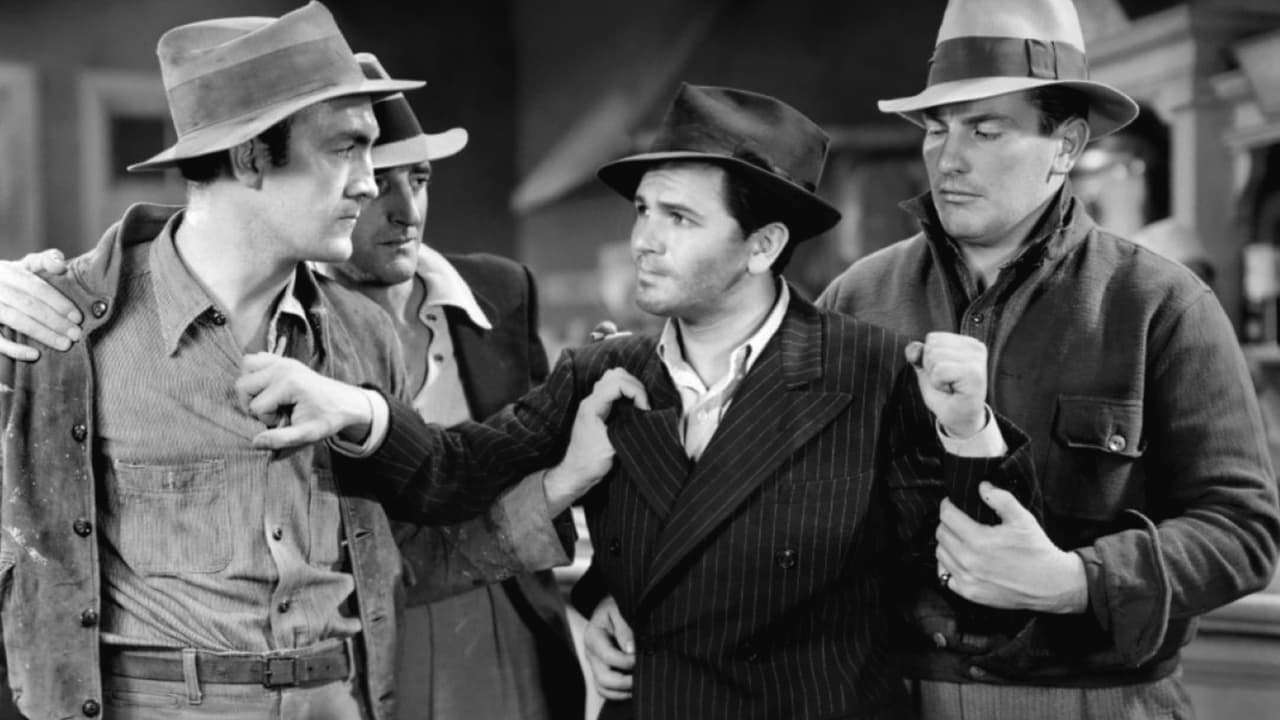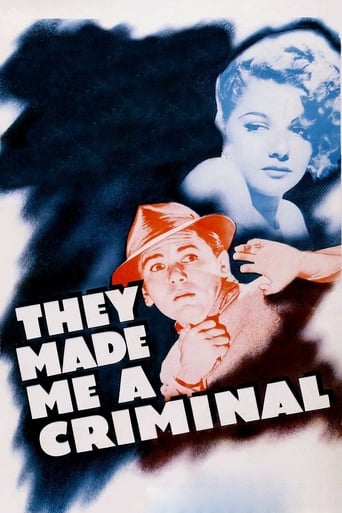ChicRawIdol
A brilliant film that helped define a genre
Huievest
Instead, you get a movie that's enjoyable enough, but leaves you feeling like it could have been much, much more.
WillSushyMedia
This movie was so-so. It had it's moments, but wasn't the greatest.
Billie Morin
This movie feels like it was made purely to piss off people who want good shows
clanciai
This is an early noir with Busby Berkeley coming on with many surprises on the way of the typically noir theme of an innocent, having to escape from justice and the law since all the circumstantial evidence is against him and no one believes him. John Garfield was always uncouth and rowdy but managed to make the more splendid characters for their sore trials, forcing them to extreme honesty, not seldom to self-sacrifice to prove themselves right. John Garfield was expert on such characters, especially in Hemingway stories. This is different, though. Here he is hounded by a policeman notorious for his uncompromising pertinacity, who is no one less than Claude Rains, and we know how merciless he can be. John Garfield, however, finds another life in Arizona with the Dead End Kids and a girl and creates an idyllic existence away from the world, - while Claude Rains gets the scent and comes on track.John Garfield's character is not very intelligent, he follows his impulses rather than any careful thought, and his character will keep you constantly worried, for he can't end up in anything but trouble. and his honesty must keep you sticking to him with all your sympathy. How he wins the boys on his side and finally the girl just to one day meet his fate as Claude Rains turns up at the wrong moment is a fascinating thriller all the way with many psychological moments of truth. The grandma finalizes the brilliance,It's a very enjoyable and impressing film with Max Steiner's music adding to it just discreetly enough, but Busby Berkeley's direction takes the prize. The party in the beginning of the film is a triumph for him.
Rainey Dawn
The movie was pretty good minus the Dead End Kids - once they were brought into the picture it went down hill. It wasn't a focus on Johnnie's story anymore but an outlet for the Dead End Kids to act up on camera.The studio, director and writers - someone - should have kept the focus on Johnnie and police. Once Johnnie left town, they only showed the police one time and that was briefly around the middle of the film and finally got back to the police at the end of the film.OH don't expect to see a lot of Claude Rains in this one - he's in the film as a tough cop - did well with the role handed to him - but he's not in the film all that much.Anyway - I would like this film much more if the Dead End Kids were NOT in the film and would have most likely rated the film higher!! They put way too much focus on them and not on the what the story is about: Johnnie being framed for a murder he didn't commit.4/10
dougdoepke
It's a Warner Bros. production, in spades—from Garfield to the gritty subject matter to the seedy surroundings. If MGM was the glamour studio, Warner's was the no-nonsense Plain Jane. Here boxing champ Johnnie (Garfield) hobos it to the California desert to escape a New York murder rap. There he hooks up with tough blonde (Dickson) and her juvenile delinquent date pickers (Gorcey, et. al.). Trouble is that Detective Phelin (Rains) won't give up the chase, and now Johnnie's in a pickle he can't fight his way out of.Okay, nothing unusual about the plot, except maybe the setting. Nevertheless, director Busby Berkeley manages to blend the elements into a good gritty little tale. Well, that's except for the fight scenes, which prove Berkeley was better at arranging dancers than boxers. Even so, he makes maybe the best use of that ragamuffin outfit that would become the Bowery Boys that I've seen. Even the usually buffoonish Huntz Hall is under firm control. But maybe the biggest challenge was getting aristocratic Claude Rains to impersonate a street wise New York cop, of all things. Fortunately, that excellent actor pulls it off better than expected. And, of course, there's the great Garfield showing why his brand of feisty urban grit was so perfect for the times. Then there's the one scene that still has me sweating. Johnnie and the boys are cooling off inside a big water-filled irrigation tank. Okay, no problem. Except, farmer somebody decides his date trees need water, and before they know it, the boys are clawing at the bare metal sides, trying to escape the ten feet of water he's left in the bottom. Sure, they're okay, but only so long as they keep swimming and swimming, trapped like flotsam in a fish bowl. It's a sweaty doomsday setup that comes out of nowhere.Anyway, this is the type of film that made me a fan of hardscrabble Warner Bros. of the 1930's. So catch up with it if you can.
Robert J. Maxwell
John Garfield is a promising but dissolute boxer in New York. He gets boozed up at one of his parties, takes a swing at a guest, and passes out. His treacherous manager hits the offending guest with a bottle and kills him. Then he arranges things so that it looks as if Garfield has killed the man in a drunken rage. The manager takes off and is killed in a car accident. Result, Garfield is about to be arrested for the crime and instead takes to the road with only $250 in his pocket, with a police detective, Claude Raines, keeping a keen lookout for his whereabouts.Garfield becomes a bum, riding the rails, looking for work, hiding the fact that he's a boxer because any popularity along those lines might lead to Raines' attention.He winds up at a cozy reform school for boys in Palm Desert, California, run by a warm blond, Gloria Dixon, and her oh-so-Irish mother. Their only consignment is half a dozen kids from the New York slums, the Dead End Kids, who pick dates from the groves and sell them to the few passers by in this isolated little farm.The problem is that the place is going broke and they're cut off from any outside financial help. One of the kids has a dream of opening a gas station. They are the only house on a 60-mile stretch of empty road so the prospects are good, but a gas pump costs $2000. They don't have $2000. Dixon, grandma, and the kids have barely enough to live on.Then, through the seasonable interposition of a gracious Providence, a big brute of a fighter, Gaspar Rutchek by name, comes to town offering a couple of grand to anyone who can stay in the ring with him for three rounds.At first, Garfield is excited because, after all, he's a professional fighter himself, though far outweighed by the much larger Rutchek. He signs up for the contest and goes into training, but a photo of him alerts Claude Raines and brings him to Palm Desert.Garfield knows this, but gets into the ring anyway. He's clobbered by Rutchek but gets through three rounds and wins enough to buy the pump and open the gas station. The moment he recovers, he's placed under arrest, but Garfield's parting scene with Dixon convinces Raines that Garfield is kewl and Raines lets him go back to his sere paradise and his juicy blond.Well -- "they" didn't make him a criminal. He made himself a criminal by acting like one after having been labeled a "murderer" by Claude Raines. After all, instead of running away, he COULD have gone to the police and hired a good defense counsel. In real life, I expect he would have been convicted anyway, but not in movies like this.It's a near-perfect illustration of labeling theory in sociology. Anybody interested can Google it, but I'll give one example taken from a study of wounded veterans. Many were in pain and given morphine, to which they became somewhat addicted. Their withdrawal was distressing. Some were never told the reason for their distress, and they went on to normal lives. Those who were told that they were addicted to morphine went on to careers as drug addicts because they'd been "labelled" as such by the authorities. (I'm simplifying, but you can understand why.) The general idea is that if everyone treats you as a rat, then eventually you come to believe that you're a no-good skank and you act appropriately. We derive our identities from the way others treat us. That's what happens to Garfield in New York, with his manager and Raines telling him he's a murderer. So he acts like one and becomes a fugitive. I'll skip any further details.Garfield is as good as he usually is, which is to say he's professional. I understand there are viewers who like him a lot, and indeed he was in real life a stand-up guy, but as an actor he's no better and no worse than most others in the Warner Brothers' stable -- Alan Hale, George Raft, Edward G. Robinson, and the rest. Gloria Dixon doesn't make much of an impression. Grandma is a comic stereotype. The Dead End kids still were integral to a serious plot -- not yet part of a formula -- and aren't bad, especially in a scene in which they're about to drown in a water tank in the desert. Busby Berkeley, of all people, is responsible for the direction of this depression-era story. He's pretty much functional, no more than that. His innovative impulses seem to be reserved for expression during fantasmic shots of multitudes of girls shaping themselves into roses and signs displaying the benign features of Franklin Delano Roosevelt.It's an interesting story, though, without much in the way of ambition or style. Not memorable, but not insultingly corny either.

